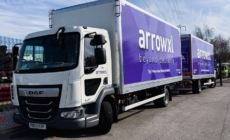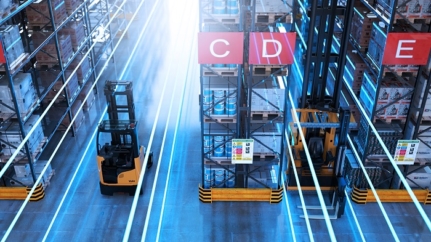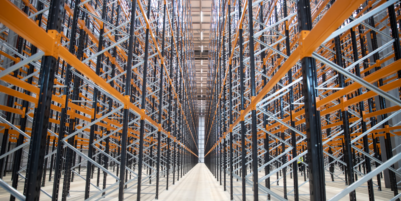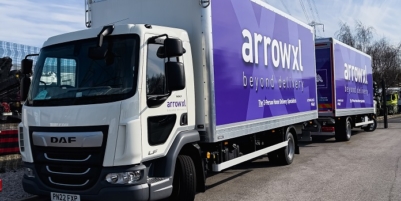-
ROSSLARE EUROPORT TARGETS HEALTH & SAFETY WITH CAMERA TELEMATICS PARTNERSHIP - 2 days ago
-
Landmark Study Reveals Wearable Robotics Significantly Boost Safety and Efficiency in Industrial Environments - July 24, 2024
-
Visku Tackle The Retail Seasonality Challenge One Pallet At A Time - July 22, 2024
-
KAMMAC AND BERGEN LOGISTICS STRENGTHEN FASHION & LIFESTYLE SERVICES IN THE UK - July 19, 2024
-
TENTBOX EXTENDS PARTNERSHIP WITH ARROWXL TO SUPPORT INCREASING DEMAND - July 17, 2024
-
The Perfume Shop improves customer journeys while driving profitability in partnership with Scurri - July 17, 2024
-
ZEROMISSION SECURES £2.3M ($3M) INVESTMENT TO ACCELERATE ELECTRIC FLEETS - July 16, 2024
-
BCMPA CELEBRATES SUCCESS OF 2024 CONFERENCE - July 15, 2024
-
Best of the Best: Jungheinrich Celebrates Triple International Award Win - July 12, 2024
-
GOPLASTICPALLETS.COM CALLS ON NEW CHANCELLOR RACHEL REEVES TO CONSIDER PLASTIC PACKAGING TAX REFORM - July 10, 2024
Through working closely with customers and dealers, Yale Lift Truck Technologies has identified inflexibility as a key concern for fast-evolving intralogistics and warehouse operations.
“Warehouse operations today are facing a number of challenges, including growing customer demand, seasonal peaks, unpredictable changes, cost management, and labour retention,” says Ron Farr, Director, Warehouse Sales – EMEA, of Yale Lift Truck Technologies. “At the heart of all these challenges is a need for flexibility, and this is where intralogistics businesses are increasingly looking to rely on expert suppliers that can help them.”
Yale has a network of independent local dealers in place to support businesses by providing the specific solutions a warehouse needs as its operations change. Being local, they can offer direct to the customers’ senior decision makers, the capability to provide complementary services and support that requires local in-country knowledge and industry expertise. One example is operator training. Each country may have slightly different requirements, expectations, and even certification that Yale independent dealers are expert in.
With their industry insight, local knowledge, and intralogistics expertise, Yale’s dealer partners provide consultation to help identify the right mix and type of trucks for an operation.
“Yale Lift Truck Technologies has a range of solutions and trucks for all stages of the intralogistics operation.” Says Ron Farr. “Yale supports its dealer partners in providing their customers with the right truck, for the right application, for their business. From the Series N forklift through VNA, to the smallest warehouse pallet truck, Yale has a range of options for all intralogistics needs”.
Many Yale dealer partners can provide a one-stop-shop solution for customers by offering ancillary solutions alongside Yale warehouse equipment. This helps busy intralogistics businesses to save time and streamline processes by dealing with one supplier. The dealer partners can typically also provide service for all the solutions provided, making it simpler to manage maintenance requirements. Importantly, this approach also enables businesses to maintain the flexibility to pick and choose the right options for their operation, without being tied to a single OEM.
“What we hear from the market is that when purchasing or leasing materials handling equipment from an OEM, the customer then has obligations to that one specific supplier across a range of product types. This can result in businesses compromising on the right solution,” Ron explains. “By contrast, a flexible, independent dealer can deliver the optimum equipment and innovations from carefully selected suppliers.”
Due to being independent, entrepreneurial Yale dealers have the freedom to choose which additional solutions to offer to complement the Yale equipment range. They can select the best options for their customers. This can also include selecting what is popular and reputable in the local market. Providing a solution that is beneficial to the customer rather than having to rely on something because it is part of a larger offering. So dealers can work with specific suppliers to adapt to a customer’s individual preferences, around racking or warehouse systems, for example.
“The right solution will depend on the individual operation, and those needs can change over time. However, in speaking to intralogistics businesses, we’ve heard of multiple instances where companies have found themselves locked into materials handling equipment contracts that serve the OEM’s business model, above their needs,” says Ron.
Another issue of concern to warehouse management is how to deal with seasonal peaks or unexpected changes in demand. Yale and its dealers also have the flexibility to support businesses effectively through the challenges that come with planned or unplanned peaks in demand.
“When demand requires scaling up the materials handling fleet, it is not as simple as just adding more lift trucks,” Ron explains. “It requires a considered approach, rethinking the process, and how that needs to be managed differently.”
Yale’s dealers back up this expertise and advice with strong short term hire fleets, and locally based service support to help warehouses maximise uptime. They can also offer a wide range of multipurpose Yale warehouse equipment that adapts to different operational needs. This gives operations flexibility to choose a materials handling fleet that suits their specific requirements.
Yale’s product range offers flexibility to help warehouses tackle labour challenges, such as finding solutions to workforce shortages, high employee turnover, and staff retention. Solutions like Yale Reach Trucks and Yale Counterbalance Trucks have been designed around the operator, with ergonomic features and intuitive controls that are standard across the models. This provides flexibility within the workforce as it makes it easy for operators with different levels of experience to work comfortably and efficiently, and to easily switch between trucks to carry out different tasks as operational requirements evolve.
For some businesses, Yale robotics solutions are also being explored as part of the fix to labour market issues. However, robotic materials handling equipment is equally of interest as businesses evaluate what processes should be put in place for efficiency and future-readiness. Yale robotics may be a more flexible, affordable, and accessible option than businesses would at first expect, as it can be implemented without requiring significant rigid modifications to infrastructure.
Different businesses need different solutions, and changing pressures and demands mean businesses require suppliers who are adaptable and can offer flexibility. This is why Yale considers the flexibility of dealers when creating its global network of local experts. As these dealers are entrepreneurial and independent businesses themselves, they may be more able to flex to specific customer needs. In some cases, this may also mean greater financing options or contract flexibility.
“Our independent dealer partners allow Yale to focus on what we do best – the design and manufacture of innovative, reliable, and efficient lift truck technologies that last,” says Ron. “How might your business change in the next 5 years? You don’t know – and that’s exactly why choosing flexibility with Yale and our dealer network could offer you great opportunity.”
For more information, and to contact your local Yale Dealer, visit: www.yale.com/en-gb/europe/

































